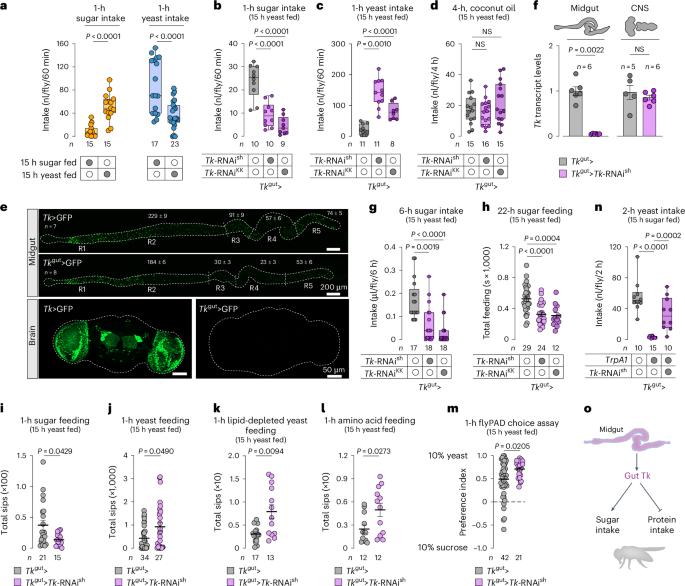Protein-responsive gut hormone tachykinin directs food choice and impacts lifespan
IF 20.8
1区 医学
Q1 ENDOCRINOLOGY & METABOLISM
引用次数: 0
Abstract
Animals select food based on hungers that reflect dynamic macronutrient needs, but the hormonal mechanisms underlying nutrient-specific appetite regulation remain poorly defined. Here, we identify tachykinin (Tk) as a protein-responsive gut hormone in Drosophila and female mice, regulated by conserved environmental and nutrient-sensing mechanisms. Protein intake activates Tk-expressing enteroendocrine cells (EECs), driving the release of gut Tk through mechanisms involving target of rapamycin (TOR) and transient receptor potential A1 (TrpA1). In flies, we delineate a pathway by which gut Tk controls selective appetite and sleep after protein ingestion, mediated by glucagon-like adipokinetic hormone (AKH) signalling to neurons and adipose tissue. This mechanism suppresses protein appetite, promotes sugar hunger and modulates wakefulness to align behaviour with nutritional needs. Inhibiting protein-responsive gut Tk prolongs lifespan through AKH, revealing a role for nutrient-dependent gut hormone signalling in longevity. Our results provide a framework for understanding EEC-derived nutrient-specific satiety signals and the role of gut hormones in regulating food choice, sleep and lifespan. The gut hormone tachykinin (Tk) is found to be regulated by protein intake in flies and mice. In flies, Tk is shown to impact food choices, sleep and lifespan.


蛋白质反应性肠道激素速激素指导食物选择并影响寿命
动物根据饥饿感选择食物,这反映了动态的大量营养素需求,但营养特异性食欲调节的激素机制仍不明确。在这里,我们发现速激肽(Tk)是果蝇和雌性小鼠的一种蛋白质反应性肠道激素,受保守的环境和营养敏感机制的调节。蛋白质摄入激活表达Tk的肠内分泌细胞(EECs),通过雷帕霉素(TOR)靶点和瞬时受体电位A1 (TrpA1)的机制驱动肠道Tk的释放。在果蝇中,我们描绘了一条途径,通过胰高血糖素样脂肪运动激素(AKH)信号传导到神经元和脂肪组织,肠道Tk控制蛋白质摄入后的选择性食欲和睡眠。这种机制抑制蛋白质食欲,促进糖饥饿,调节清醒,使行为与营养需求保持一致。抑制蛋白质反应性肠道Tk通过AKH延长寿命,揭示了营养依赖性肠道激素信号在长寿中的作用。我们的研究结果为理解eec衍生的营养特异性饱腹感信号和肠道激素在调节食物选择、睡眠和寿命方面的作用提供了一个框架。
本文章由计算机程序翻译,如有差异,请以英文原文为准。
求助全文
约1分钟内获得全文
求助全文
来源期刊

Nature metabolism
ENDOCRINOLOGY & METABOLISM-
CiteScore
27.50
自引率
2.40%
发文量
170
期刊介绍:
Nature Metabolism is a peer-reviewed scientific journal that covers a broad range of topics in metabolism research. It aims to advance the understanding of metabolic and homeostatic processes at a cellular and physiological level. The journal publishes research from various fields, including fundamental cell biology, basic biomedical and translational research, and integrative physiology. It focuses on how cellular metabolism affects cellular function, the physiology and homeostasis of organs and tissues, and the regulation of organismal energy homeostasis. It also investigates the molecular pathophysiology of metabolic diseases such as diabetes and obesity, as well as their treatment. Nature Metabolism follows the standards of other Nature-branded journals, with a dedicated team of professional editors, rigorous peer-review process, high standards of copy-editing and production, swift publication, and editorial independence. The journal has a high impact factor, has a certain influence in the international area, and is deeply concerned and cited by the majority of scholars.
 求助内容:
求助内容: 应助结果提醒方式:
应助结果提醒方式:


